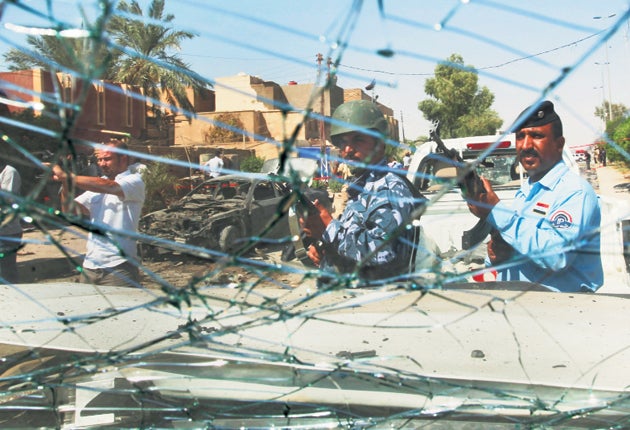60 die as insurgents target Iraqi forces in wave of bombings

At least 60 people – civilians and members of the security forces – were killed and hundreds more wounded yesterday as a coordinated series of insurgent bombs exploded across Iraq in the country's bloodiest day of violence this year.
The 37 explosions came a fortnight after Iraqi officials said they were ready to negotiate a limited US military presence after the planned 31 December deadline for the withdrawal of all American troops.
The bombs were detonated in more than a dozen cities and included an explosion in a parked car, roadside devices and a vehicle driven into a police station by a suicide bomber.
At least 35 people were killed and 64 injured in the day's most lethal attacks, in the main market of the city of Kut, 100 miles south-east of Baghdad. Police said one bomb went off in a freezer used to store cold drinks and, as rescuers and onlookers gathered at the scene, a second bomb, this time in a parked car, exploded.
The bombings appeared to serve a double purpose, underlining both the extent to which security provided by Iraq's own forces can be breached and the risk of further attacks if any US troops remain after the due withdrawal date.
As residents in Kut complained that cars are supposed to be kept out of the market area by police, one shop-owner, Ali Jumaa Ziad, asked the Associated Press: "Where is the government with all these explosions across the country? Where is [Prime Minister Nouri] al-Maliki? Why doesn't he come to see?"
The attacks came after what had been a drop in the level of violence: 178 people were killed in attacks during July in Iraq excluding in the semi-autonomous region of Kurdistan, compared with 342 violent deaths in June and 321 in May.
The bombings appeared to be aimed mainly at security forces in both Sunni and Shia areas. In the Diyala province, north of Baghdad, a local security official told the New York Times that six people were killed and 29 wounded in at least a dozen explosions.
The mayor of Baquba, the provincial capital, was injured, along with three of his bodyguards, when a bomb exploded near his convoy. Five Iraqi security force members were killed in separate shooting attacks on two checkpoints in the city.
Just outside the holy southern Shia city of Najaf, a vehicle driven by a suicide car bomber careered into a checkpoint outside a police building, according to a local security official.
Police opened fire when the driver refused to stop and the vehicle then exploded, killing four people and injuring 32 others. Firefighters sprayed water on burning cars as a body was loaded into a police vehicle under a red sheet.
There was no immediate claim of responsibility for the attacks. But Theodore Karasik, a Middle East security expert at the Dubai-based Institute for Near East and Gulf Military Analysis, accused al-Qa'ida in Iraq of trying to disrupt the internal Iraqi political process and send a message to the Americans.
He told AP: "It seems that al-Qa'ida in Iraq is playing a propaganda game at the same time it's trying to show that it can still carry out deadly violence.
"If the US extends its military presence, al-Qa'ida in Iraq can use it as a tool by saying, 'Look, the Americans have reversed their decision to leave and are staying on as occupiers'. They could use this as a justification for more attacks."
Join our commenting forum
Join thought-provoking conversations, follow other Independent readers and see their replies
Comments
Bookmark popover
Removed from bookmarks